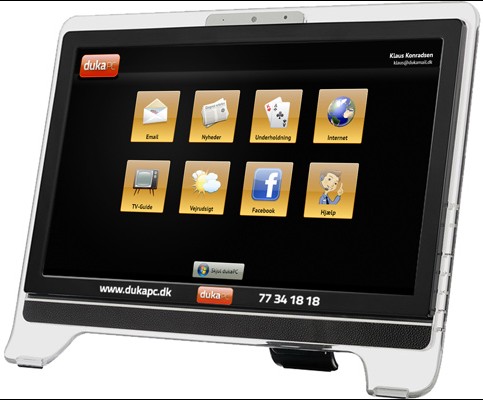Computer for the elderly?

This is not the first time I have noticed attempts by various companies to make a certain “computer for the elderly.” The main goal of such a computer is to achieve a level of ease of use so that it does not cause difficulties for people who are practically unable to work with a computer. I saw the latest announcement of another company for another such computer recently, in early December: "A computer for the elderly has been developed in Denmark . " In my opinion, the need and importance of such computers is artificially overstated. Why I decided this, and how such “computers for the elderly” are “created” in general, you will learn by reading this article.
Let's start by figuring out the creation process. Read the news:“The Danish company DukaPC has created a desktop for the elderly and those who are just starting to get acquainted with IT technology. To get started, DukaPC explains, just power up the computer. A simple interface allows you to quickly access the Internet, email, news, games, weather reports and the Facebook network. You won’t have to configure anything. ”How did the Danish company manage to“ create ”such a desktop? We look at the photo - either from the news , or directly on the company's website :

What do we see? We see a computer in the performance of "all-in-one", or "monoblock". As a system administrator, the appearance of the computer seemed very familiar to me, and I decided to find where my legs were growing from. I will not languish - this is MSI Wind Top AE2020 :

Compare technical specificationsDukaPC and MSI Wind Top AE2020- they are also very close. We come to a simple conclusion: all that DukaPC “created” is a shell for launching several main programs. True, there are a couple of points that distinguish this "computer for the elderly" from a regular computer: firstly, they have a wireless modem installed (3G or 4G - it is not known for sure), and secondly, "updating software components and fixing problems if such will arise, DukaPC promises to carry out remotely ”(by the way, this service is paid, by a subscription method). In such a simple way, you can not only "create" a "computer for the elderly", but also make money on it even after the sale. What about the price? According to information from the manufacturer’s website, the unit itself costs DKK 6.995.00, which in Russian rubles will amount to about 37 tr, + a service pass for a year of approximately 1.330 rubles. For comparison - in Russia such a monoblock is on December 2010 about 27 tr. (but - without the shell calling the main programs).
A small digression regarding these shells - in fact, there are simply a lot of similar things for Linux, both oriented for using computers as media players, and for ordinary household tasks (for example, many companies develop similar things for netbooks). I think remaking such a finished shell for the tasks described above is not so complicated, inexpensive, and fast enough. But back to the existing options.
The attempt to create a “computer for the elderly” is by no means the first. So, even in the past, 2009, I came across an initiative of a British company called SimplicITy :

The idea is the same - a large on-screen menu for calling the main programs, plus several video courses for use in the kit. Earlier, in 2008, Fujitsu announced a laptop for the elderly - on it the most commonly used buttons on the keyboard are highlighted and marked with larger icons and symbols than on conventional laptops, the programs in the menu are highlighted, and an extended help system is provided. This laptop was originally planned for distribution in the Japanese market, and then around the world, but in January 2011 I did not find any more mention of it on the network.
However, references to such computers, as you can see, happen regularly, but for some reason they don’t get fame and dissemination anyway. Why? I’ll try to answer with a free literary translation of one of the comments on the news about SimplicITy: “My family considers me a computer expert, since I sell computers and set them up for my clients. With rare exceptions, most people learn computer skills quickly enough. My mother, who is already 79, got a laptop a couple of years ago, and now she is connected via Wi-Fi, and she works with mail on it, uses the Internet search, plays games, downloads music to the player, etc. She recently started using Skype to chat with my sister in New Zealand. Finally, she is considering opening computer courses for her acquaintances, most of whom are younger than her ... But my brother, 53, seems to be getting closer to a complete misunderstanding of such things. He calls me four times a week for completely stupid issues. So, as you can see, age is not the main reason for anything. You either want to learn how to use something for yourself, or you fall into a stupor and return to using only your hands. ”
My opinion on the basis of the information collected is as follows:some special simplified interfaces for ordinary elderly people are not really needed, except for the initial demonstration that "it can be not so difficult." There is no fundamental difference in learning how to select one large icon on the screen out of six, or how to click on the usual icon on the desktop, since after choosing it, you still need to type text for writing or searching for information, or search for a person on Skype and call up it will have to be the same with him. But what pensioners may really need is the usual training in the basics of computer literacy, plus help with choosing a computer to purchase and an Internet provider, plus technical support (answers to questions) in the initial stages of development. And, I think, video courses with thoughtful, slow, will be useful and in demand. An understandable explanation of the basic simple actions so that they are easy to review and remember. And everyone who is ready with ideas, in a word, deed to help grandparents master the computer, we will be glad to see with us, in the project"Grandma is online . "
Related link: Gadgets for seniors
PS: maybe transfer to some thematic blog?
